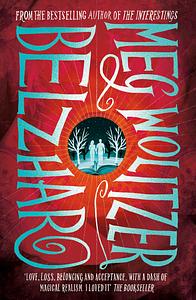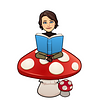You need to sign in or sign up before continuing.
Take a photo of a barcode or cover
I was okay with it until the last third. That's where it lost a full star! I'll admit I didn't see the twist coming, but all it did was induce copious eye-rolling on my part.
My feelings about this book are conflicted and I'm not quite sure what to say, so as a review I think I'll process those feelings a bit. I'm going to write in vague, general terms about my experience, but even that will give hints to things in the book that are meant to be surprising and so might be a bit spoilerish. Be warned before reading further.
A brief overview: Jam is being sent to a special boarding school for "emotionally fragile, highly intelligent" teens, since she hasn't been able to get over the trauma of the death of her first boyfriend, whom she loved intensely. At the school, she bonds with four peers in a special class where they read Sylvia Plath and write in journals that magically transport them to their last happy moments before their traumatic experiences, and they help each other begin to process and move on.
There are many things I enjoyed about the book. The story is well told, the teens seemed authentic, the gradual process of finding connection with others, coming out of isolation, and healing was honest and believable, and the theme of words being incredibly impactful is one I strongly believe. At times I felt the proceedings bordered on boring, but overall I liked much of the book.
But--and here's where I'm conflicted--the big reveal didn't work for me at all. I know mental illness is a highly personal experience that is hard for others to understand so I believe in being accepting and nonjudgmental, which makes me feel bad for what I'm about to say, as it goes against that belief. Nevertheless, it was my emotional experience with the book.
So. I knew there was going to be a reveal, since for most of the book Jam never shares the details of her trauma. And I strongly suspected the reveal would be a surprising twist, since there were hints she wasn't being completely honest--as a character or narrator. I even guessed at what the surprise might be fairly early, but then backed away from that theory based on her actions and descriptions the rest of the book. It turned out I should have trusted my gut. The problem is that, once Jam was finally forthcoming and honest, I found myself completely lacking in empathy or sympathy for her. I should have had it, but I didn't, and I couldn't stop myself from judging her negatively in response; I was unable to uncritically accept her the way the other characters in the book did.
I think--and here's where I fault the writing and not just my reading--much of my reaction had to do with the fact that Jam never shared her story until right at the end, so I was never allowed to feel what she was feeling. I was told what she was feeling, that she loved intensely and lost tragically, but I was never shown it in a way that made me feel it, too. I wasn't drawn into her experience of love and loss, and so my reaction to her full reality was intellectual instead of emotional. I wanted to feel for her, but I couldn't. And that, ultimately, spoiled the book for me and leaves me having a hard time writing positively about it.
That's where I am right now, anyway. I know many others haven't had the same issues I have, so maybe after talking with some of them and reflecting I'll feel differently. For now, though, I can only bring myself to give this three stars.
A brief overview: Jam is being sent to a special boarding school for "emotionally fragile, highly intelligent" teens, since she hasn't been able to get over the trauma of the death of her first boyfriend, whom she loved intensely. At the school, she bonds with four peers in a special class where they read Sylvia Plath and write in journals that magically transport them to their last happy moments before their traumatic experiences, and they help each other begin to process and move on.
There are many things I enjoyed about the book. The story is well told, the teens seemed authentic, the gradual process of finding connection with others, coming out of isolation, and healing was honest and believable, and the theme of words being incredibly impactful is one I strongly believe. At times I felt the proceedings bordered on boring, but overall I liked much of the book.
But--and here's where I'm conflicted--the big reveal didn't work for me at all. I know mental illness is a highly personal experience that is hard for others to understand so I believe in being accepting and nonjudgmental, which makes me feel bad for what I'm about to say, as it goes against that belief. Nevertheless, it was my emotional experience with the book.
So. I knew there was going to be a reveal, since for most of the book Jam never shares the details of her trauma. And I strongly suspected the reveal would be a surprising twist, since there were hints she wasn't being completely honest--as a character or narrator. I even guessed at what the surprise might be fairly early, but then backed away from that theory based on her actions and descriptions the rest of the book. It turned out I should have trusted my gut. The problem is that, once Jam was finally forthcoming and honest, I found myself completely lacking in empathy or sympathy for her. I should have had it, but I didn't, and I couldn't stop myself from judging her negatively in response; I was unable to uncritically accept her the way the other characters in the book did.
I think--and here's where I fault the writing and not just my reading--much of my reaction had to do with the fact that Jam never shared her story until right at the end, so I was never allowed to feel what she was feeling. I was told what she was feeling, that she loved intensely and lost tragically, but I was never shown it in a way that made me feel it, too. I wasn't drawn into her experience of love and loss, and so my reaction to her full reality was intellectual instead of emotional. I wanted to feel for her, but I couldn't. And that, ultimately, spoiled the book for me and leaves me having a hard time writing positively about it.
That's where I am right now, anyway. I know many others haven't had the same issues I have, so maybe after talking with some of them and reflecting I'll feel differently. For now, though, I can only bring myself to give this three stars.
Check out my review here: http://www.memyshelfandi.com/2014/09/book-review-belzhar-by-meg-wolitzer.html
Overall an easy and fun read with a surprising ending.
"Belzhar" was a good-but-not-great book, robbed of some of its heft by a revelation very late in the story. I adore Meg Wolitzer, and she did create an interesting set of troubled teens for this novel. The book makes a good case for the power of reading and of writing as well as friendship.
'Sometimes it's easier to tell ourselves stories.' This is my first experience with Wolitzer. This is Wolitzer's first experience with teen fiction. And she is spot on. One could read this novel and complain about the formulaic structure, but that would be admitting too much focus on all the wrong things. I've read novels reviewed as works focused on the power of literature to matter and the significance of art in the day to day. Wolitzer does all this, but makes it feel so magical. Few books remind me who I am and what I wanted for myself. And how I wanted to find some thing/some way to help others. One gasps when discovering oneself in a book. When a book happens in your hands. I don't know how many hands I'll get this book into, but I hope you're lucky enough to be one of them.
An interesting concept, but the puke-worthy catastrophization of the main character made it difficult to read. There are some amazing sentences sprinkled throughout the book. Ones that made me stop and reread the sentence and murmur "...truth!" But, then I'd hit a page where the main character pines ad nauseam about the demise of her 41 day relationship*. Some of the people at the Wooden Bar have gone through legitimate tragedy and it seems some just need to grow up. That's my two-cents!
* If you've read the book you know the ridiculous nature of this claim.
* If you've read the book you know the ridiculous nature of this claim.
Wrong book for the wrong person at the wrong time? I enjoyed it almost all the way through- the last few chapters just ruined it.
Not that exciting. And I did not care for the twist. But I guess it could be important because it deals with teens with mental health issues.





